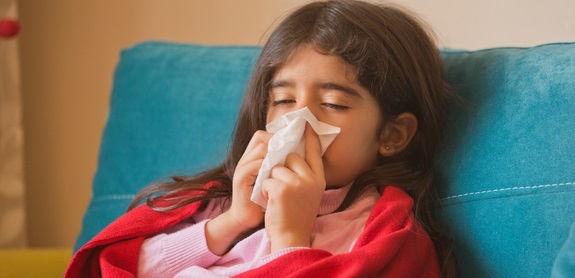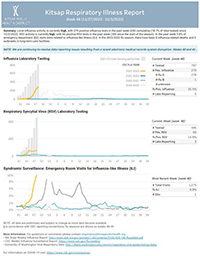
Seasonal respiratory illnesses: Resources for Cold & FLU SEASON

A respiratory illness is a disease that affects a person’s lungs or breathing. Viruses are a common cause of respiratory illness, especially during fall and winter — sometimes called “cold and flu season.” Examples of respiratory illnesses caused by viruses include:
- Common cold (rhinovirus, coronavirus, and other viruses)
- Flu (influenza viruses)
- RSV (respiratory syncytial virus)
- COVID-19 (novel coronavirus: SARS-CoV-2)
Click on the links above to learn more about each type of illness. Visit the CDC’s respiratory illness page to learn about non-seasonal respiratory illnesses.
WHO IS AT RISK?
Seasonal respiratory illnesses, such as cold and flu, are often mild but can cause severe complications. Some people, including young children, older adults, and people with certain health conditions, are at higher risk for severe illness.
Because seasonal respiratory illnesses are very common, fall and winter are often the busiest time of year for hospitals and clinics. Severe respiratory illness seasons can overburden healthcare services, making it more difficult for everyone in the community to access care.
Regardless of your risk level, it is important to take steps to prevent getting and spreading respiratory illnesses.

PREVENTING RESPIRATORY ILLNESSES
Seasonal respiratory illnesses spread from person to person. You can get sick by spending time close to someone who is sick — especially if they are coughing or sneezing — or by having contact with objects such as doorknobs or tissues that have virus on them.
Take steps to avoid getting and spreading respiratory illnesses:
- Avoiding close contact with people who are sick
- Washing hands frequently
- Avoiding touching your face with unwashed hands
- Staying home as much as possible when you are sick and keeping children home from school or daycare. Test for COVID-19 and follow guidance.
- Wearing a mask when you are in crowded indoor spaces
Stay up to date on immunizations:
Staying up to date on immunizations can help keep you and your family healthy during respiratory illness season.
- A yearly flu vaccine is recommended for everyone ages 6 months and older.
- COVID-19 vaccination is recommended for everyone ages 6 months and older.
Contact your healthcare provider or go to vaccines.gov to find vaccines near you. Learn more about recommended immunizations at cdc.gov/vaccines.
SYMPTOMS, CARE, AND WHEN TO SEEK MEDICAL ATTENTION
Different respiratory illnesses have different symptoms. Runny nose, coughing, sneezing, tiredness, fever, and sore throat are all symptoms commonly associated with seasonal respiratory illnesses. Learn more about symptoms of cold, flu, RSV and COVID-19.
Note: Although some people refer to “stomach flu,” this illness is not related to influenza. “Stomach flu” typically refers to norovirus, an extremely contagious virus that causes gastrointestinal illness. Learn more about norovirus.
Care for yourself or a household member at home if you have mild symptoms and are not at high risk for severe illness:
- Get plenty of rest
- Drink fluids
- Use over-the-counter medications to ease symptoms, such as fever or headache.
Contact a healthcare provider if you or a household member are concerned about symptoms or are at high risk for severe illness:
- Call your regular healthcare provider or a clinic
- Call a nurse hotline (hotlines are often available through insurance plans)
Seek immediate medical attention if you or a household member are experiencing severe symptoms, such as difficulty breathing or dehydration:
- Call 911 or go to the closest hospital emergency room.
LEARN MORE
- Kitsap Public Health District flu page
- Kitsap Public Health District COVID-19 page
- Kitsap Respiratory Illness Report | Subscribe to receive this report weekly
- Washington State Department of Health flu page | COVID-19 page
- CDC flu page | RSV page | COVID-19 page
© 2023 KITSAP PUBLIC HEALTH DISTRICT | 345 6TH STREET, SUITE 300 BREMERTON, WA 98337 | 360-728-2235 | Terms of use & Privacy Policy | Staff Login

